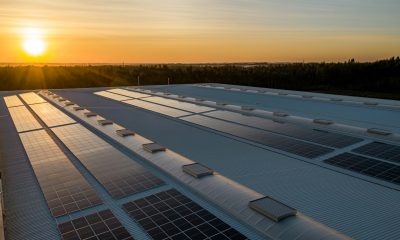Featured
Coima launches ESG fund of urban regeneration, with a target over €1 bln
The Italian company Coima has recently launched an ESG fund, with the aim of investing in sustainable regeneration of the country. The fund’s investment potential is already in excess of $1.7 billion (€1.5 billion), with an already identified “pipeline” of over $1.13 billion (€1 billion). From a financial point of view, the fund targets a rate of return (Irr) of over 10% in the development phase.

Coima sgr, a company specializing in the management of real estate investment funds on behalf of institutional investors, launched Coima ESG City Impact Fund, the first Italian closed-end investment fund with measurable ESG (Environmental, Social & Governance) impact objectives.
Building on the experience gained in the development of the Porta Nuova area in Milan, the fund will invest in sustainable regeneration of the territory at a national level. The official placement follows a first phase of funding already completed for about $450.8 million (€400 million) with Cassa Forense, Cassa Nazionale Dottori Commercialisti, and Inarcassa as cornerstone investors who have identified the initiative as strategic for channeling investments into the real economy of the country.
Find out more about Coima ESG City Impact Fund recently launched and read the latest business news with our companion app, Born2Invest.
The rate of return targeted by the fund is more than %10
The fund’s investment potential is therefore already in excess of $1.7 billion (€1.5 billion), with an already identified “pipeline” of over $1.13 billion (€1 billion). Through progressive funding and subsequent capital increases during the fund’s life (20 years), Coima ESG City Impact Fund aims to achieve funding of over $1.13 billion (€1 billion) with the capacity to develop over $4.5 billion (€4 billion) investments with an ESG impact on the territory and the real economy.
From a financial point of view, the fund targets a rate of return (Irr) of over 10% in the development phase and a stabilized dividend of over 5% in the income phase. The fund is structured with a scalable approach through an open investment architecture, i.e. with the possibility to expand its economic, environmental and social impact also through co-investments, partnerships and contributions in addition to bank and supranational bodies’ leverage.
Examples of open architecture development include the Coima ESG City Impact Fund, Covivio, and Prada for participation in the sale of the Porta Romana airport in Milan. The fund’s investments will be mainly focused on urban regeneration and reuse of buildings that contribute to updating the national physical infrastructure with respect to the evolution of demand and technological innovations that will enable new social and physical models.
Tourism and housing as priority sectors
The priority areas identified are those of housing and tourism, in particular in the context of neighborhood-scale urban regeneration development that can contribute to the creation of a wider supply chain. At the basis of the initiative there is the idea that the pandemic and economic crisis highlights the need for an approach capable of generating a more widespread and sustainable well-being, focusing on the Italian territory.
The launch of the fund “represents a commitment at the service of Italy and a contribution to developing real economy projects in partnership with the best institutions, universities and research centers, entrepreneurs and companies in both the private and public sectors, and significant returns in terms of sustainability,” highlighted Manfredi Catella, founder, and CEO of Coima. According to him, “the Italy of a thousand bell towers can represent a model of sustainable territorial development and an alternative to concentration in megacities. The presentation of the fund was also attended by the mayor of Milan, Giuseppe Sala, who said he was ready to “actively listen” to the vision of the real estate operators and “very positive” about the future of the city in the long term, but is “very concerned” about the situation in the next two years.
__
(Featured image by Free-Photos via Pixabay)
DISCLAIMER: This article was written by a third party contributor and does not reflect the opinion of Born2Invest, its management, staff or its associates. Please review our disclaimer for more information.
This article may include forward-looking statements. These forward-looking statements generally are identified by the words “believe,” “project,” “estimate,” “become,” “plan,” “will,” and similar expressions. These forward-looking statements involve known and unknown risks as well as uncertainties, including those discussed in the following cautionary statements and elsewhere in this article and on this site. Although the Company may believe that its expectations are based on reasonable assumptions, the actual results that the Company may achieve may differ materially from any forward-looking statements, which reflect the opinions of the management of the Company only as of the date hereof. Additionally, please make sure to read these important disclosures.
First published in askanews, a third-party contributor translated and adapted the article from the original. In case of discrepancy, the original will prevail.
Although we made reasonable efforts to provide accurate translations, some parts may be incorrect. Born2Invest assumes no responsibility for errors, omissions or ambiguities in the translations provided on this website. Any person or entity relying on translated content does so at their own risk. Born2Invest is not responsible for losses caused by such reliance on the accuracy or reliability of translated information. If you wish to report an error or inaccuracy in the translation, we encourage you to contact us.

-

 Business6 days ago
Business6 days agoDow Jones Breaks 50,000 as Bull Market Surges Amid Caution and Volatility
-

 Business2 weeks ago
Business2 weeks agoBattered, but Still Bullish on Gold & Silver
-

 Impact Investing4 days ago
Impact Investing4 days agoEU Backs 90% Emissions Cut by 2040 and Delays ETS2 Rollout
-

 Crowdfunding2 weeks ago
Crowdfunding2 weeks agoNewcleo Raises $85 Million to Advance Fourth-Generation Nuclear Reactors

























